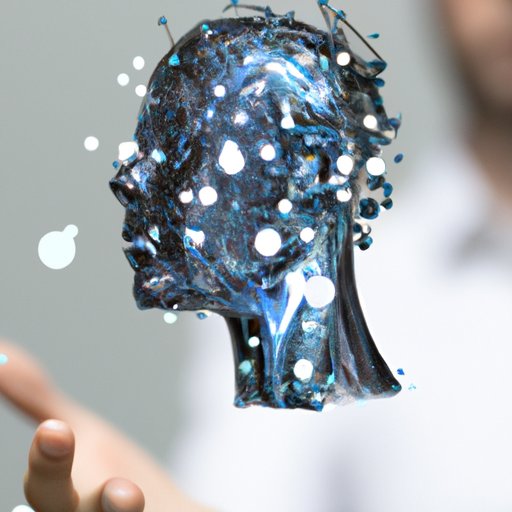Introduction
Artificial Intelligence (AI) is a rapidly growing field that has had a major impact on our lives. From intelligent assistants to self-driving cars, AI technology is advancing at an incredible rate. One area of AI research that has generated a great deal of debate is the question of whether AI can be creative. Can machines really create something new and innovative? In this article, we will explore the possibilities of AI being creative, examining examples of AI-assisted creativity, potential benefits and risks, as well as implications for the future of AI and creativity.
Exploring the Possibilities: Can AI be Creative?
The idea of computers being able to create something new and innovative is a concept that has been around for decades. However, with the advancement of AI technology, it is now possible to explore this idea more deeply. AI-assisted creativity is the process of using AI algorithms to help generate new ideas or solutions. This could involve using machine learning to identify patterns in data, or using generative algorithms to generate images or content.
Examples of AI-Assisted Creativity
One of the most common examples of AI-assisted creativity is in the field of music. AI algorithms are being used to compose original music, often by taking existing pieces and remixing them in unique ways. AI algorithms are also being used to generate visuals, such as artwork and videos. AI is even being used to help create new flavors of food and drinks.

Potential Benefits of AI Creativity
There are several potential benefits to using AI to assist in the creative process. For one, AI-assisted creativity can reduce the amount of time and effort required to come up with new ideas. AI algorithms can quickly analyze large amounts of data and generate ideas and solutions much faster than humans. Additionally, AI algorithms may be able to identify patterns and connections that humans would not be able to detect. This could lead to new and innovative ideas that would otherwise be overlooked.
The Pros and Cons of AI Creativity
While there are potential benefits to using AI to assist in the creative process, there are also some potential risks. One of the main concerns is the fear that AI algorithms could replace human creativity. There is a fear that AI algorithms could be used to generate content that is indistinguishable from what a human could create, leading to a decrease in the need for human input. Additionally, there is the potential for AI algorithms to make mistakes or produce results that are not desirable.
AI-Inspired Art: What Does It Mean for Creativity?
AI algorithms are being used to create art as well. AI-inspired art can take many forms, ranging from paintings to sculptures to video installations. The use of AI in the arts raises interesting questions about the nature of creativity and artistic expression. While some argue that AI algorithms can lead to new and innovative forms of art, others worry that the use of AI could lead to the devaluation of human creativity.

Examining the Impact of AI on Human Creativity
As AI technology continues to advance, it is important to consider the impact that it could have on human creativity. On the one hand, there are potential advantages to using AI to assist in the creative process. AI algorithms can provide valuable insights into data and can help to identify patterns and connections that might otherwise be overlooked. Additionally, AI algorithms can help to reduce the amount of time and effort needed to come up with new ideas.
On the other hand, there are potential risks to using AI to assist in the creative process. There is the potential for AI algorithms to replace human creativity and lead to a decrease in the need for human input. Additionally, there is the potential for AI algorithms to make mistakes or produce results that are not desirable. As such, it is important to consider the implications of using AI to assist in the creative process.
Is AI Replacing or Enhancing Human Creativity?
The debate over the use of AI in the creative process is ongoing and there is no clear consensus on the issue. Some argue that AI can be used to enhance human creativity by providing insights that would otherwise be overlooked. Others argue that AI algorithms could replace human creativity and lead to a decrease in the need for human input. Ultimately, it is up to each individual to decide whether they believe AI is replacing or enhancing human creativity.
The Future of AI and Creativity: What Are the Implications?
As AI technology continues to advance, it is important to consider the implications for creativity. AI algorithms can provide valuable insights and can help to reduce the amount of time and effort needed to generate new ideas. However, there is also the potential for AI algorithms to replace human creativity and lead to a decrease in the need for human input. As such, it is important to consider the implications of using AI to assist in the creative process.
Conclusion
In conclusion, AI-assisted creativity is a rapidly growing field that has the potential to revolutionize the creative process. AI algorithms can provide valuable insights into data and can help to reduce the amount of time and effort needed to come up with new ideas. However, there is also the potential for AI algorithms to replace human creativity and lead to a decrease in the need for human input. Ultimately, it is up to each individual to decide whether they believe AI is replacing or enhancing human creativity.
(Note: Is this article not meeting your expectations? Do you have knowledge or insights to share? Unlock new opportunities and expand your reach by joining our authors team. Click Registration to join us and share your expertise with our readers.)
